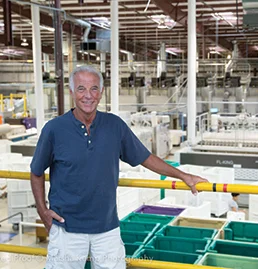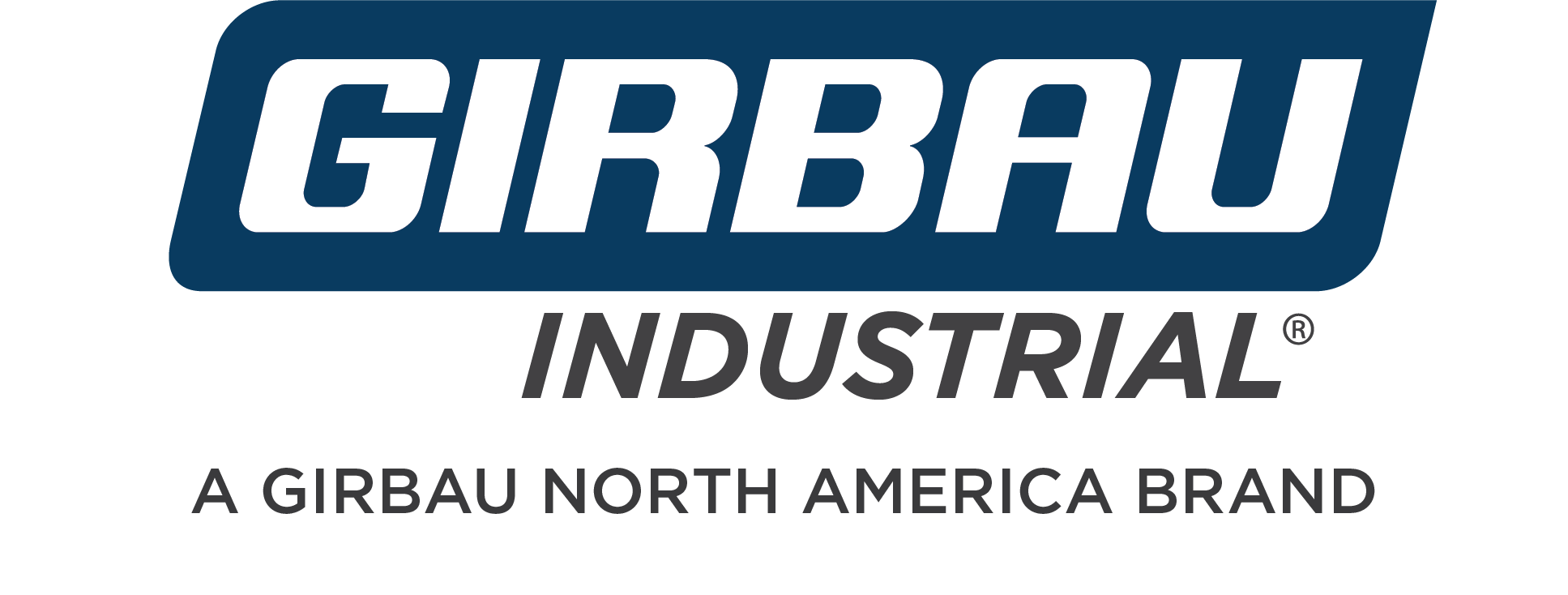Laundry Plus Delivers with Twin Tunnel Systems
March 2015 | Download Testimonial
Two are better than one. Craving additional laundry capacity and production, Laundry Plus, an industrial laundry in Bradenton, Fla., recently moved to a new state-of-the-art plant – and to keep pace with booming sales – added a second Girbau Industrial (GI) TBS-50 Continuous Batch Tunnel Washing System. The twin GI tunnel systems – capable of processing up to 70,000 pounds of laundry in an 11-hour day – opened the door to new business, dropped water usage to .6 gallons of water per laundry pound, and more than doubled production.
Each system features a 12-module TBS-50 Continuous Batch Tunnel Washer, SPR-50 Water Extraction Press and associated conveyor and shuttle systems. These systems share 10 in-line ST-100 Dryers (250-pound capacity each). All system components are controlled from a central station where customer goods are color coded and tracked throughout the washing, extraction and drying process.
“We didn’t expect to grow so much so soon,” said owner Rick Rone, who installed the first GI tunnel system just four years ago. Even though that system added 30,000 pounds of laundry capacity per 10-hour shift, Rone quickly found himself at a production threshold. Business boomed as Rone took on new accounts. Laundry Plus – focused on delivering a quality product and excellent customer care – promises a 24-hour turnaround on customer-owned goods (COG). Rone believes it’s this commitment that sets Laundry Plus apart. “We were running the first tunnel 24/7 and couldn’t take on any more laundry,” he said.

Orchestrating the Move
It wasn’t easy to orchestrate the laundry’s move into a new plant. Nonetheless, Laundry Plus production and service never ceased. The first phase of the move maintained production at the old plant while the new GI tunnel system and ironing lines were installed and tested at the new plant. Once those systems were operational and programmed to meet the needs of every client, laundry production at the old plant halted and the new plant took over. The final phase involved moving existing equipment from the old location to the new location. A huge undertaking, this involved relocating, installing and testing a GI tunnel system, Continental open-pocket washers, three ironing lines and more. Production using the existing equipment kicked in once it was fully operational. The resulting gains in productivity and efficiency have positioned Laundry Plus for new business and so much more …
New Plant and Equipment Fulfills Multiple Goals
By adding a second GI tunnel system and moving equipment from two buildings into one, Rone enjoys streamlined production. The new plant – with its arsenal of high-performance equipment – opens the floodgates to new business, ensures backup in case of a mechanical failure, and allows Rone to launch a new linen rental program. Happy with the productivity, efficiency and flexibility of his first GI tunnel system, Rone maintains the decision to invest in a second identical system was a no-brainer. He likes the security they bring.
“No one else in our area has enough capacity to bail us out if we have a machine failure,” said Rone. “By running both tunnels 12-15 hours per day, we put ourselves in a position that if one of the tunnels or shuttles goes down, we can run the remaining tunnel 24 hours per day and control our own destiny.” This ensures Laundry Plus customers receive a 24-hour laundry turnaround – no matter what.
And, by adding linen rental, Rone maintains he can better manage laundry production and further improve profitability. Currently, Laundry Plus launders 100 percent COG.
“We’ve locked in on a linen rental program,” said Rone. “We are getting contracts put together, specifying packages and isolating customers to call on. We’ll bring in a minimum of 3.5 to 4 par level for our own needs,” said Rone. “With linen rental we will have enough par level to launder our own inventory. That way, we can balance the production schedule and stabilize the use of our machinery.”
No matter the segment of business pursued, Laundry Plus processes it efficiently and quickly, using less labor. “Our goal hasn’t changed,” said Rone. “Quality and service come first. We definitely know we could cut labor costs further, but every time you take human eyes away from your product, it creates another chance that something will slip through. Value is the operative word at Laundry Plus. We aren’t necessarily the cheapest, but we offer the most value of any industrial laundry out there.”
Nonetheless, Laundry Plus has drastically cut labor since 2010, when it dropped from five employees on the conventional wash line to just one on the first tunnel system. Now, with two tunnels, Laundry Plus uses two employees to load the tunnel conveyor and enter customer programs. From there, laundry automatically passes through each of the 12 tunnel modules, into the press and dryers.
Similarly, bolstered ironing and folding lines amp productivity and quality, using less labor.
Automation in Ironing
GI ironing lines were added in 2011 and 2014. They feature GI PC-120 two-roll ironers (130- and 138-inch widths), DRF Feeders and FL-King Folders with dual stackers. They complement two existing lines – featuring a Chicago ironer and folder, and a two-roll Jenson Ironer. “We have a total of four ironing lines and use the GI lines as our two primary lines because they produce the best quality,” said Rone.
Smartly, each line has the same customer programs in case one requires routine maintenance and shut down. The GI lines are most productive, according to Rone. “Without presorting we process 600 pieces per hour. If we presort, we can go to 800-900 pieces per hour, or 1100 for twins and 850 for kings.” One of the benefits of linen rental will be the ability to presort laundry for quicker ironing and folding, according to Rone. “It allows us to get higher productivity out of the machinery,” he said. Four employees operate the GI ironing lines; three feed and one catches.
Open-pocket Washers Key for Food and Beverage
Because Laundry Plus caters to the hospitality COG market, it also handles an influx of food and beverage laundry. “Our mix of conventional open-pocket washers take on a lot of food and beverage, as well as accounts that are smaller than our business model,” said Rone. “We run laundry through the open pockets and use a little more water per pound, but we are heating up a smaller machine to 160 degrees.”
A line-up of Continental Girbau E-Series Washers in 20- to 255-pound capacities is used to process these smaller volume accounts. Rone chose them for their soft-mount design and high-speed extract, which reaches 387 G-force. Half of the laundry’s open-pocket washers were relocated to the new plant. The others were added this year. The soft-mount design simplified the transfer since no bolts or grout are required for installation. And, because the washers generate high-speed extract, they remove more water per load and cut resulting dry time.
Individually Programmable Tunnel Modules
“We will run food and beverage laundry through a tunnel once we have enough volume,” said Rone. The modules on the tunnels are very flexible. To handle food and beverage, we can easily heat up the water to 160 degrees and increase transfer times between modules to four minutes,” he said. Right now, they are set for two-minute transfers.
The beauty of the GI tunnel system is its flexibility, according to Rone. It is programmed from a central control, which allows for 99 general programs. Moreover, each of the 12 modules is programmable for water temperature and levels, bath partitions, rapid draining, chemical injection, closing parameters and more. This ensures that customer goods – which vary in thickness, quality and thread count – are properly cleaned. Once goods move through the tunnels and are pressed into cakes, they are automatically loaded into one of the 10 ST-100 Dryers. Sheets are quickly conditioned and put through the ironing line, while other goods are fully dried and run through the folding line. The dryers feature an infrared temperature sensor that automatically puts them into cool-down mode once goods reach their optimum temperature and are properly dried. This prevents over-drying and fabric damage, according to Rone.
Vacuum Loading Dryers
The newest ST-100 Dryers feature optional vacuum loading, which is particularly helpful once the tunnels are shut down for the day. Then, those five dryers are used to dry food and beverage items that come out of the plant’s large Continental open-pocket washers. “We start the tunnels at 3:30 in the morning and they are shut down around 3:30 p.m.,” said Rone. “So the dryers on those lines are still available for us. You put the dryers into manual mode, unload laundry from the tilt washer into a cart, and feed the dryers through the vacuum tubes.” It’s a quicker, easier way to load a big dryer. “If anything happened to the shuttles, presses or tunnels, we still wouldn’t lose those five dryers. They can be put into manual mode and utilized,” said Rone.
Streamlined & Efficient
Finding ways, such as this, to utilize equipment and gain efficiencies is critical, according to Rone. Making even small adjustments can improve profits, cut utilities, shave labor hours and streamline productivity. Since moving from the old plant, Laundry Plus has successfully made huge efficiency gains. “We knew there were tremendous efficiencies to be gained from a well planned plant,” said Rone. Terry comes out of the dryer closer to the automatic towel folders; flat goods come out of the tunnels and dryers closer to the ironing lines; work stations are ergonomically designed; and transportation within the plant is minimized. Laundry Plus measures these efficiencies by pounds of laundry per operator hour (PPOH). Since moving to the new plant and installing its second tunnel, another ironing line and additional open-pocket washers, Laundry Plus has boosted PPOH by 15-18 percent.
To discover more about Laundry Plus, visit www.laundryplususa.com. To find out more about Continental or Girbau Industrial laundry systems, visit www.continentalgirbau.com, or www.girbauindustrial.com, or call 800-256-1073.
